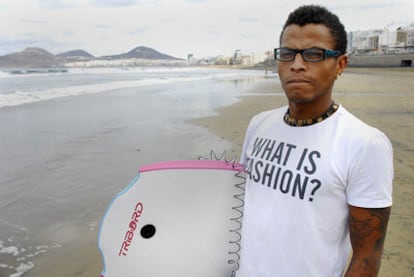Man facing deportation: "Does it count that I was born in Spain?"
David Mifumu says he is a Canarian, but the authorities want to send him to Equatorial Guinea owing to his criminal record
David Mifumu, 28, wears a mischievous smile, and like the easygoing Spaniard he claims to be, talks incessantly. Born in Las Palmas in the Canary Islands, he was told his mother is Equatorial Guinean, all he remembers about her is related to onetime dictator Francisco Macías. He has no recollection of his father. After two criminal sanctions and eight months in jail for selling hashish, he now faces deportation to a country he's never set foot in: Equatorial Guinea.
Mifumu's life is like something out of a film. When he was only nine months old, Social Services in Las Palmas took him and his twin brother from the custody of their mother and sent them to a juvenile center in Gran Canaria. His mother occasionally visited on weekends, sometimes accompanied by their father.
Adolescent Mifumu spent his days in a municipal center in Santa Brígida, Gran Canarias, where he made many friends. By the time he turned 18, he had moved into a tent in city park and later, a ravine. Finally, neighbors suggested he take residence in a vacated home where he still lives.
He worked in construction and made Social Security payments for eight months, until he began selling hashish. At 24 years-old, the Civil Guard caught him with 18 grams of the drug; he almost went to prison but they let him go for absence of a criminal record. Not long after, they caught him again, this time with one gram, or five euros worth, according to the report. He was sentenced to eight months, spent transferring between prisons in Las Palmas de Gran Canaria, León and Zaragoza.
During a routine inspection in Zaragoza, they told Mifumu a new order arrived instructing all undocumented prisoners with crimes against the public be deported. "Deported to where?" he asked. He had never left the Canaries until he went to prison. After serving his time, he returned to the Canaries with the order in hand.
Mifumu called his lawyer but was told he'd been reassigned to a new lawyer, Germán Gorgees. Gorgees appealed against Mifumu's deportation and asked for a delay in proceedings until all the options had been examined. The judge agreed.
Gorgees based his defense on an administrative error. According to the evidence presented in court on December 21 in Zaragoza, no one had notified the law office of the judicial citation and the National Police had sent it to Mifumu without locating him, something that could be proven through postal records. Moreover, Gorgees identified a handful of deportation processing dates he thought seemed irregular.
Mifumu's record states "unlocated" on February 4, for which they solicited his immediate deportation from the country, explained Gorgees. But there are inconsistencies, he added. The letter that sanctions his expulsion is postmarked four days after the original order. What's more, according to the registry, it arrived in the Canarias on February 10, one day before the order had been published in Aragon's Official Bulletin, without which Mifumu could have appealed. The sentence has been delayed for a couple weeks.
While he waits, this young man wonders, "Does it count that I may have been born in Spain 28 years ago?" He hopes to find out who his father is, or was, and his lawyer is trying to locate his mother said to be living in an elderly person's home in Lanzarote.

Tu suscripción se está usando en otro dispositivo
¿Quieres añadir otro usuario a tu suscripción?
Si continúas leyendo en este dispositivo, no se podrá leer en el otro.
FlechaTu suscripción se está usando en otro dispositivo y solo puedes acceder a EL PAÍS desde un dispositivo a la vez.
Si quieres compartir tu cuenta, cambia tu suscripción a la modalidad Premium, así podrás añadir otro usuario. Cada uno accederá con su propia cuenta de email, lo que os permitirá personalizar vuestra experiencia en EL PAÍS.
¿Tienes una suscripción de empresa? Accede aquí para contratar más cuentas.
En el caso de no saber quién está usando tu cuenta, te recomendamos cambiar tu contraseña aquí.
Si decides continuar compartiendo tu cuenta, este mensaje se mostrará en tu dispositivo y en el de la otra persona que está usando tu cuenta de forma indefinida, afectando a tu experiencia de lectura. Puedes consultar aquí los términos y condiciones de la suscripción digital.








































